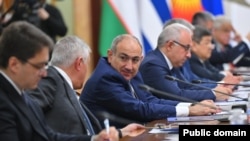The one-sentence law declares the “start of a process of Armenia's accession to the European Union.” The National Assembly controlled by Prime Minister Nikol Pashinian’s party approved it despite stern warnings from Russia.
Some senior Russian officials have said that its passage marked the beginning of Armenia’s withdrawal from the Eurasian Economic Union (EEU). Membership in the bloc gives the South Caucasus nation a tariff-free access to the Russian market.
Speaking to journalists, Papoyan stressed that Armenia has not applied for EU membership and remains part of the EEU.
“As a member of the government, I don’t know of any other agenda,” he said when asked about a possible exit from the EEU. “There isn’t any, dear people.”
The law in question was drafted by several pro-Western groups loyal to Pashinian. They collected last year 60,000 signatures in support of their demands for a referendum on joining the EU. Pashinian said in January that he expects Armenian and EU officials discuss a “roadmap” to Armenia’s accession to the bloc.
Foreign Minister Ararat Mirzoyan indicated on Wednesday no such discussions have been held so far. Armenia is not planning to “reformat our allied relations with Russia,” Mirzoyan said after talks with his visiting Russian counterpart Sergei Lavrov.
For his part, Papoyan pointedly declined to say whether EU membership is a long-term goal for Yerevan.
Meanwhile, Tigran Khzmalian, who leads one of the pro-Western groups campaigning for the referendum, accused Pashinian’s administration of “freezing” the accession process contrary to the law approved by it.
“They have analyzed and concluded that getting reelected in 2026 is more important,” said Khzmalian. “We understand that they won’t listen to us anymore.”
Lawmakers representing Armenia’s main opposition groups voted against the law on EU membership. They warned of its severe consequences of the domestic economy heavily dependent on Russia’s vast market, cheap energy resources and capital inflows.
Russia accounted for over 41 percent of Armenia’s foreign trade last year, compared with the EU’s 7.7 percent share.




